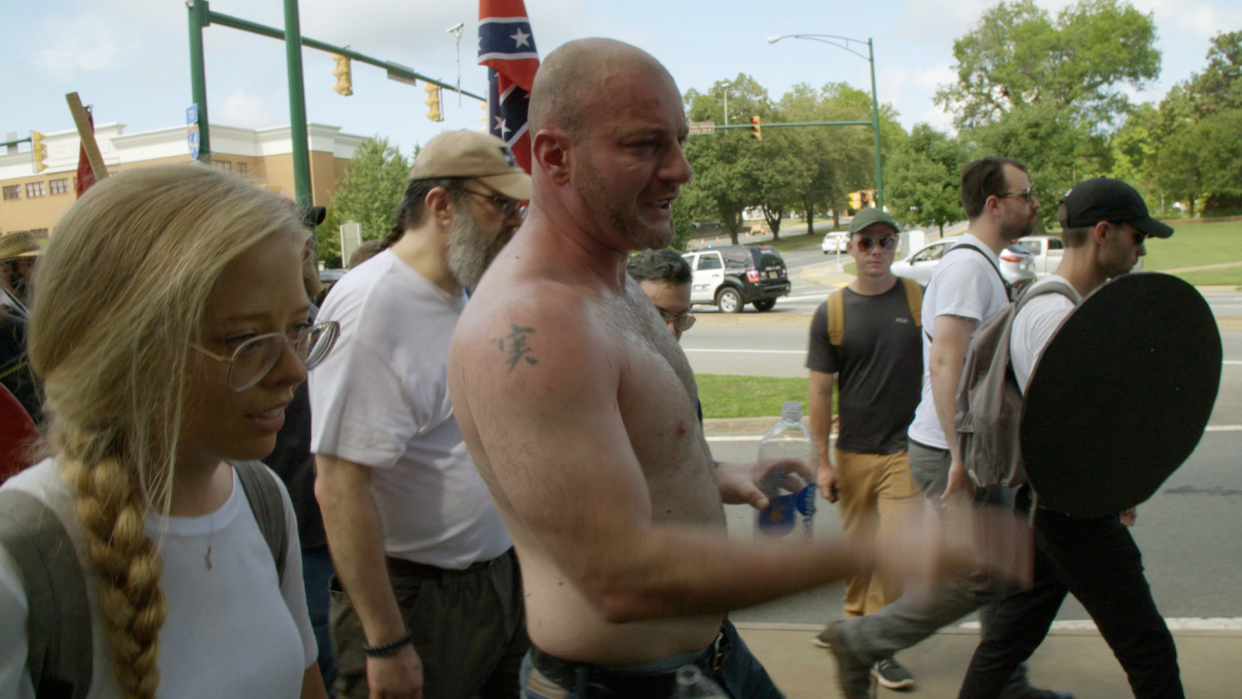Vice News journalist on what it's like to be recognized by Nazis

The following is an excerpt from our project Charlottesville: One Year Later. Yahoo News spoke to over a dozen people connected to the deadly August 2017 rally about how things have changed over the past 12 months. To read the rest of their stories, click here.
By the time she got to Charlottesville, Elle Reeve, correspondent for “Vice News Tonight on HBO,” was already pretty well known among the white supremacist groups gathered there. And with her oversize glasses, she was hard to miss.
“I had been covering these guys for a while and so everywhere I went, they knew who I was,” Reeve says. “There was no slipping into the crowd as anonymous reporter. And they knew who I’ve dated; they knew my boyfriend’s Jewish, so they would yell things about that to me.”
If they didn’t know her before, they do now. Vice’s documentary, “Charlottesville: Race and Terror,” captures white nationalist leaders — including David Duke, Matthew Heimbach and Christopher Cantwell — from the torch march on Friday night to their tense clashes with counterprotesters on Saturday morning, as well as the frantic moments after the deadly car attack in downtown Charlottesville early Saturday afternoon.
Cantwell, a self-described white nationalist and podcast host, was recruited to be a speaker at the rally by Jason Kessler, the event’s organizer.
Reeve, who embedded with Cantwell that weekend, says she did not feel physically threatened — even when she hopped in a van with Cantwell and other neo-Nazis as they raced away from a park.
“I mean, you just make these really quick calculations about the spot, like, ‘Well, I’m not gonna get out unless they drag me out,’” she says.
There was one moment that unnerved Reeve and her crew: when they visited Cantwell in his hotel room.
“This isn’t in the piece, but he started screaming at me,” Reeve says. “He was very, very angry and did start reloading the AR-15 by the end of the interview. Everybody was just like, ‘Alright, this is great, great talking to you and we’re going to go now.’”
Reeve has kept in touch with Cantwell since the documentary aired.
“He called me after it and said that I had represented him fairly,” she says. “But as the consequences from Charlottesville sort of snowballed over time, he started to feel a lot more antagonistic.”
After Charlottesville, Cantwell a posted a video online that shows him fighting back tears after learning a warrant was issued for his arrest. It went viral, and he was dubbed the “Crying Nazi.” Cantwell later turned himself in, and wound up serving more than five months in jail on assault and weapons charges stemming from his use of pepper spray during a clash with counterprotesters.
“I’ve only texted with him since he’s gotten out,” Reeve says. “I did talk to him for like an hour and a half a few weeks ago. Just to sort of see, I don’t know, what he was thinking. I was also just kind of curious whether he’d had any doubts about — I mean, it’s not just white nationalism. He believes in eugenics. We sort of raised science theories. I wanted to push on that and see if he still believes it. He still believes it.”
While most people who recognize the bespectacled Vice News correspondent in public now are friendly, there was one particularly creepy encounter for Reeve in the past year.
“I was going through the security line at the airport for Christmas and the TSA guy recognized me,” she recalls. “And I’m like, ‘Oh, thank you, thank you, thank you.’ And I go through the whole rape-y scan machine, and I get out and I’m putting on my shoes, and he comes over and he tells me this little joke that lets me know that he’s a Nazi. It’s not like he specifically saw my scan or whatever, but it was just really creepy. It was just like this sense of, ‘Oh, they’re everywhere.’”
“I mean, we saw that in Charlottesville the torch night,” Reeve says. “There were hundreds of white nationalists, very well organized. They had a security team. They had vans bringing the protestors. They also did not look like the people upper-middle-class white people in the East Coast think of when they think of racists or white supremacists.
“And I think that’s a really hard reality for people to accept that a lot of these white nationalists are from New Jersey, they went to prep school, they live in nice neighborhoods, they look like people you know. So, I think it’s really important to show that.“
Capturing the harsh reality of Charlottesville was just as important.
“One reason why the documentary got so much attention that it was used to fact-check the president’s statements,” Reeve says. “There are people who wanted to give the idea that this was just like history buffs or, like, people who were civil war reenactors, people who love that Confederate statue — and that’s not what it was about.”
_____
Read more from Yahoo News on Charlottesville, one year later:
New Charlottesville mayor vows to keep pushing ‘until it’s done right’
‘Cryin’ Nazi’ blames rally organizer for Charlottesville ‘catastrophe’
Charlottesville photographer would return Pulitzer if he could save Heather
Former Virginia governor remembers troopers who died in Charlottesville
Trump’s ‘both sides’ response to Charlottesville still elicits anger



